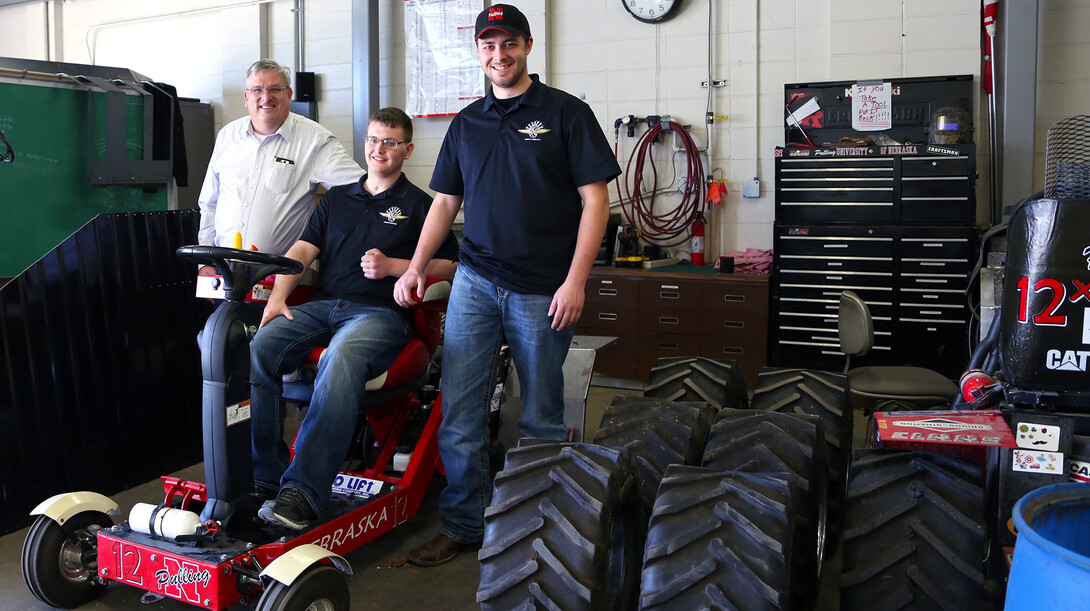
Support from family, friends and faculty, coupled with a single-minded determination are helping Caleb Lindhorst overcome a life-altering accident and succeed at UNL.
A day after finishing finals in December 2013, Lindhorst suffered traumatic brain injury after being ejected during a rollover accident on a gravel road near his hometown of Lindsay, Nebraska. Due to the extent of the injury — a twisting of the brainstem — doctors gave Lindhorst only a 10 percent chance of emerging from the coma he had faded into.
Thirty-nine days later, Lindhorst was awake — paralyzed on the left side and unable to talk, but raring to rebuild damaged neural pathways in his brain.
“People kept telling me what I would never be able to do again,” Lindhorst said. “I kept telling them to challenge me so I could prove them wrong.”
He relearned how to walk (with some assistance from a walker) and talk at Madonna Rehabilitation Hospital in Lincoln. Lindhorst then ran into more motivation after completing two months at Madonna and transferring to a facility in Omaha.
“A speech therapist at that facility told Caleb that he probably would never return to college,” said Roger Hoy, director of the Nebraska Tractor Test Laboratory at UNL and a professor of biological systems engineering. “That really frustrated him. His body was broken down, but I could have told them that there was nothing wrong with Caleb mentally.”
Hoy, who hired Lindhorst to work at the tractor test lab and served as his academic adviser, was among the UNL contingent that paid regular visits to the injured student. During one of Hoy’s first visit, Lindhorst talked about coursework and how he wanted to attend an upcoming engineering design competition.
“When he started talking about that competition and college coursework, I knew there was nothing wrong between his ears,” Hoy said. “During my visits, it was really clear that Caleb wasn’t being challenged enough. That’s when we went to work.”
Hoy started visiting two or three times a week in spring 2014 to teach lessons from a fundamental engineering class. The instruction was slow at first, but Lindhorst progressed steadily. Still, Hoy felt bad when he handed over the final exam.
“I wanted him to complete it on time so he would be free and clear when he returned to take classes in the fall,” Hoy said. “I sent a text asking if he was doing OK on the final and offered assistance on one question if he needed it. He responded by saying, ‘I don’t need any help.’
“He completed the test on time and passed easily.”
Lindhorst proved that speech therapist wrong and returned to UNL at the start of the fall 2014 semester. He continues to improve both his ability to talk and walk, using a motorized cart to dart between classes and a walker to navigate in classrooms. The transition has been eased with assistance from Luke Prosser, a senior agricultural engineering major who has been friends with Lindhorst since their first semester on campus in fall 2011.
Prosser — who was also a regular visitor during Lindhorst’s hospital and rehabilitation stays — lives with Lindhorst and lends a hand or provides rides as needed. For those efforts, Prosser was named to the 2015 Franco’s List, an award named after Juan Franco, UNL’s vice chancellor for student affairs, that recognizes students who demonstrate positive characteristics that are part of being a person of integrity.
Though he graduates on May 9 and has accepted a job in Beatrice, Prosser will continue to live with Lindhorst this summer and into the next academic year.
“What I’ve done to help him is not that big of a deal,” Prosser said. “Caleb is my best friend. We’re like brothers. He would do the same thing for me.”
As part of their studies this year, Lindhorst and Prosser are half of a leadership team developing an entry for the International Quarter Scale Tractor Student Design Competition. The competition — the same one Lindhorst wanted to attend after the accident — kicks off May 28 in Peoria, Illinois.
“Caleb’s dad brought him out to see the competition a year ago,” Hoy said. “But, this year he’s part of the leadership team doing the heavy lifting in terms of the design work. This competition is a chance to show that you can take what you learn in a classroom and apply it on a real world project.”
The team is shooting for a top-10 finish.
As for the future, Lindhorst is on course to graduate in May 2016 and he is working to obtain an internship. He also will continue working to erase the effects of the accident.
“I plan on walking without assistance by next fall,” Lindhorst said. “This is the path my life has taken and I have no choice but to pass through it.
“The accident might have slowed me down, but it won’t stop me.”







